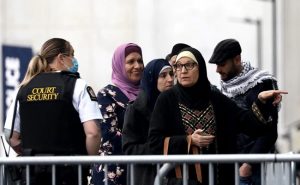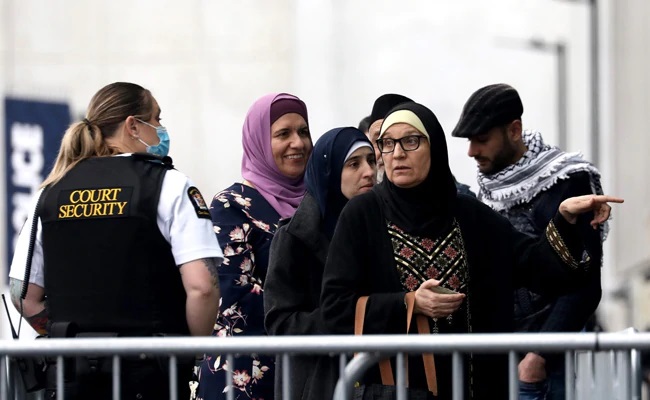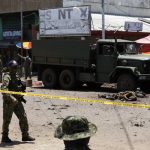The sentencing hearing for Brenton Tarrant opened in a Christchurch court with testimony from members of the Muslim community that the white supremacist targeted on March 15 last year in a rampage that claimed the lives of 51 worshippers.

Survivors and family members of Christchurch mosque attacks victims arrive outside the Court.
Wellington: Some survivors raged, others chanted prayers, and many wept for lost loved ones — but all of those who lived through New Zealand’s mosque shootings had a message of defiance Monday as they stood before the gunman.
The sentencing hearing for Brenton Tarrant opened in a Christchurch court with testimony from members of the Muslim community that the white supremacist targeted on March 15 last year in a rampage that claimed the lives of 51 worshippers.
Despite the horror they experienced at the two mosques, witnesses were uncowed as they confronted Tarrant, who sat impassively in the dock.
“You transgress beyond comprehension, I cannot forgive you,” said Maysoon Salama, whose son Atta Elayyan was killed.
“You gave yourself the authority to take the souls of 51 innocent people, their only crime — in your eyes — being Muslims.”
Salama said the 29-year-old had not achieved his self-appointed mission to undermine New Zealand’s small, tight-knit Muslim community.
“You thought you could break us, you failed miserably,” she said.
“We became more determined to hold tight to Islam and our beloved ones are martyrs.”
Khaled Alnobani echoed the sentiment, pointing to Tarrant and declaring: “We have become more united. Thank you for that.”
‘Your hatred is unnecessary’
Gamal Fouda, the Al Noor mosque’s imam, said he would not allow Tarrant’s actions to sully a place of peace and love for his people.
“I was standing on the pulpit and saw the hate in the eyes of a brainwashed terrorist, I lived with that nightmare afterwards,” he said, telling Tarrant: “Your hatred is unnecessary.”
Janna Ezat, whose son Hussein Al-umari was killed as he tried to rush the shooter, said she made a decision not to hate Tarrant.
“I decided to forgive you Mr Tarrant because I don’t have hate… If we are able to forgive, we forgive,” she said.
“The damage was done and Hussein will never be here but I have only one choice and that is to forgive you.”
Temel Atacocugu, originally from Turkey, said he drew hope from the outpouring of support the wider New Zealand community showed for their Muslim compatriots after the atrocity.
“I came to New Zealand to live with my family because it’s a peaceful country and, despite the events of March 15, I believe it will stay that way,” said Atacocugu, who played dead after being shot nine times at the Al Noor mosque.
‘I will never forget’
Mariam Gul, whose parents and sister were murdered, said Tarrant needed to educate himself and acknowledge that Islam was a religion of peace.
“This realisation can come if he independently studies Islam,” she said.
The court heard of evidence of children shot in cold blood and the wounded callously gunned down while calling for help as Tarrant ran amok in the mosques, creating what some described as a war zone.
Some survivors talked about suffering permanent disability and mental anguish that remained fresh more than a year after the atrocity.
“I see the images and I hear the constant sound rata-rata-rata — the sound of the gun shooting in my head,” said Abdiaziz Ali Jama, a 44-year-old Somali refugee.
PromotedListen to the latest songs, only on JioSaavn.com
“I see a lot of dead people. I have been frightened, I talk constantly at night. I hear noise and go outside sometimes to look for the shooter. I will never forget what I saw that day.”



